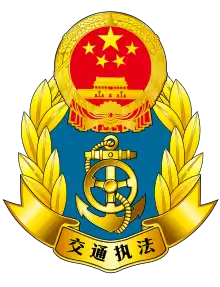Ministry of Transport of the People's Republic of China
The Ministry of Transport of the People’s Republic of China (MOT; Chinese: 中华人民共和国交通运输部) is an agency responsible for railway, road, air and water transportation regulations in Mainland China.[1] It is a constituent department of the State Council.
| 中华人民共和国交通运输部 Zhōnghuá Rénmín Gònghéguó Jiāotōng Yùnshūbù | |
.svg.png.webp) | |
 Sign of the Traffic Law Enforcement of the PRC | |
 Ministry of Transport HQ in Dongcheng, Beijing | |
| Agency overview | |
|---|---|
| Formed | 1912 Present form established March 2008 |
| Preceding agencies |
|
| Jurisdiction | Mainland China |
| Headquarters | Beijing |
| Agency executive |
|
| Parent agency | State Council |
| Website | http://www.mot.gov.cn/ |
History
The MOT's origins date back to 1912 when the Ministry of Transportation and Communications of the Republic of China was established.
In early March 2008, the National People's Congress announced the creation of a combined ministry for road, air and water transport. The Ministry of Communications, Civil Aviation Administration and the State Postal Bureau were merged into the new Ministry of Transportation.[2] This excluded rail transport, which was administered by the Ministry of Railways until its regulatory function passed to the MOT in March 2013.
Several agencies reporting to the Ministry. These include:
- Civil Aviation Administration of China
- State Post Bureau, which regulates China Post
- China Maritime Safety Administration
Former English name
One predecessor to the current ministry was the Ministry of Communications (MOC). In other countries, a Ministry of Communications is responsible for telecommunications and broadcasting. However, the Chinese MOC supervised road and water transport, with other ministries overseeing telecommunications and broadcasting. This discrepancy was caused by changes in the English language that took place after the Ministry was first created.
One definition of the English word communication is the linking of two points by a means of transport.[3][4] Roads, railways, and waterways were all considered to be forms of communication.[5] When the Qing Dynasty established the Ministry of Posts and Communications in 1906, the English word communication still carried this meaning.[6] After the People's Republic of China was established, other ministries were created to oversee railways, airlines, postal services, and telecommunications. The remaining transportation functions remained with the Ministry of Communications.
However, the English language moved in the opposite direction. By 1907, communication had begun to acquire a different meaning: a system of transmitting information over a distance.[4] This eventually became the primary meaning of the word communication, while transport and transportation became the preferred terms for the linking of two points. As a result, the Chinese Ministry of Communications ended up with a different set of responsibilities from the Ministry of Communications in other countries.
List of Ministers
| № | Name | Took office | Left office |
|---|---|---|---|
| 1 | Zhang Bojun | September 1954 | January 1958 |
| 2 | Wang Shoudao | January 1958 | July 1964 |
| 3 | Sun Daguang (孙大光) | July 1964 | January 1975 |
| 4 | Ye Fei | January 1975 | February 1979 |
| 5 | Zeng Sheng (曾生) | February 1979 | March 1981 |
| 6 | Peng Deqing (彭德清) | March 1981 | May 1982 |
| 7 | Li Qing (李清) | May 1982 | July 1984 |
| 8 | Qian Yongchang (钱永昌) | July 1984 | March 1991 |
| 9 | Huang Zhendong | March 1991 | October 2002 |
| 10 | Zhang Chunxian | October 2002 | December 2005 |
| 11 | Li Shenglin | December 2005 | July 2012 |
| 12 | Yang Chuantang | August 2012 | September 2016 |
| 13 | Li Xiaopeng | September 2016 | Incumbent |
References
- "Memorandum of Understanding between the Ministry of Road Transport and Highways of the Republic of India and the Ministry of Transport of the People's Republic of China on Cooperation in Roads and Road Transportation". Embassy of India, Beijing. 23 October 2013.
- Callick, Rowan (13 March 2008). "Beijing opens green super-ministry". The Australian. Archived from the original on 27 August 2009. Retrieved 22 March 2008.
- "Communication (n.)". Online Etymology Dictionary.
- "Communication, n.". The Oxford English Dictionary.
- Trotter, R.A., Captain J. K. (1881). "The Military Prize Essay, 1881. Military Operations in the United Kingdom Considered, Particularly as Influenced by the Enclosed Nature of the Country". The Journal of the Royal United Service Institution. XXV (CIX): 3.
Means of Communication. These may be divided into rail communications, road communications, and water communications.
- "Leading in Relief to Fire Sufferers". Railway World. Philadelphia and New York. L (17): 1. 27 April 1906.
At first rail communication on the north of San Francisco over the Southern Pacific was cut off above Santa Rosa, which is sixty miles above the Western metropolis. On the south trains could not run above Fresno.
.jpg.webp)
_01.jpg.webp)